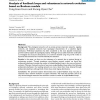Free Online Productivity Tools
i2Speak
i2Symbol
i2OCR
iTex2Img
iWeb2Print
iWeb2Shot
i2Type
iPdf2Split
iPdf2Merge
i2Bopomofo
i2Arabic
i2Style
i2Image
i2PDF
iLatex2Rtf
Sci2ools
125
Voted
BMCBI
2007
2007
Analysis of feedback loops and robustness in network evolution based on Boolean models
Background: Many biological networks such as protein-protein interaction networks, signaling networks, and metabolic networks have topological characteristics of a scale-free degree distribution. Preferential attachment has been considered as the most plausible evolutionary growth model to explain this topological property. Although various studies have been undertaken to investigate the structural characteristics of a network obtained using this growth model, its dynamical characteristics have received relatively less attention. Results: In this paper, we focus on the robustness of a network that is acquired during its evolutionary process. Through simulations using Boolean network models, we found that preferential attachment increases the number of coupled feedback loops in the course of network evolution. Whereas, if networks evolve to have more coupled feedback loops rather than following preferential attachment, the resulting networks are more robust than those obtained through ...
Related Content
| Added | 08 Dec 2010 |
| Updated | 08 Dec 2010 |
| Type | Journal |
| Year | 2007 |
| Where | BMCBI |
| Authors | Yung-Keun Kwon, Kwang-Hyun Cho |
Comments (0)

